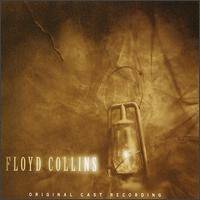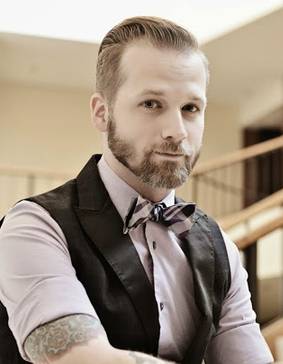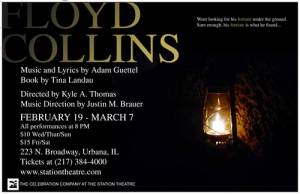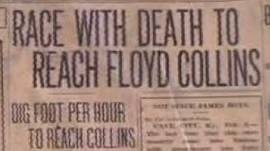Ever notice the number of big-name, prestige-project musicals that open on Broadway to great fanfare, only to close two weeks later? (What am I saying, of course you haven’t. Nobody pays attention to such things.) Trust me: It’s mind-boggling, really. Just recently, a musical composed by (and briefly co-starring) the one and only Sting went belly-up and closed its doors, leaving its cast, creators, and investors scratching their heads. Why does this happen? What’s the magical formula to producing the next Jersey Boys instead of the next The Last Ship, Leap of Faith, Rocky, or Bridges of Madison County? (I could go on and on, believe me.)
Over the years, there have been some truly great musicals that, despite having compelling stories and impressive music, have flown completely under the popular radar. Some very good musicals, in fact, never make it to Broadway at all.
 Floyd Collins, the musical with music and lyrics by Adam Guettel, book by Tina Landau, and additional lyrics by Landau, opened Off-Broadway (at Playwrights Horizons) on February 9, 1996, where it ran for just 25 performances. Despite this short-lived New York run, it won the Lucille Lortel award for Outstanding Musical as well as an Obie, then went on to have regional tours and a production in London.
Floyd Collins, the musical with music and lyrics by Adam Guettel, book by Tina Landau, and additional lyrics by Landau, opened Off-Broadway (at Playwrights Horizons) on February 9, 1996, where it ran for just 25 performances. Despite this short-lived New York run, it won the Lucille Lortel award for Outstanding Musical as well as an Obie, then went on to have regional tours and a production in London.
The lack of name recognition among the general public might make some wonder why a theatre would want to present such a musical. After all, they’re not easy to put up under the best circumstances. There are actors to wrangle, there’s music to learn, and often there’s some sort of choreography to master. And yet the Station Theatre, where Floyd Collins will open February 19th, has made quite a habit of shining a light on these curiosities.
I spoke with the show’s director, Kyle A. Thomas, about his cast, his process, and his reasons for taking a chance on this Little Show That Could.
———
Smile Politely: This is not a show that a lot of people know about, maybe even within the theatre community. How did you find out about it? What drew you to the story?
Kyle Thomas: I first came across Floyd Collins as a Musical Theatre major in undergrad. I was looking for songs and scenes to include as a part of my repertoire, and a friend told me about the show. I was immediately struck by the uniqueness of a musical like this. The music has a solid classical foundation but is structured like American folk music and Kentucky Bluegrass. The protagonist, who lends his name to the title of the show, is stuck onstage the entire show and rarely moves. There is no romantic love story as a part of the plot. As a piece of American musical theatre it is truly unique. But that also makes the appeal of a show like this much broader. Yet, there are strong universal themes and touching issues of humanity that all will empathize with. For those reasons I believe that those who consider themselves wary of musical theatre will enjoy a show like this, but also the die-hard musical lovers will find a lot to love in this show too.
SP: How was the audition/casting process? I’m always curious about audition turn-out. Some shows are lucky to get enough interest to make a go of it, while others are beating auditioners off with a stick.
 Thomas (left): Casting for this show was both an easy process and a difficult one. It was easy because I knew I wanted to cast the role of Floyd as early as possible to give the actor time to learn the part because the music is so difficult and I found someone who is perfect for the role very early. I had never met Andy Hudson, but he was the unanimous choice amongst those that I had consulted early in the production process; and upon making contact with him, he expressed excitement in the role and began working on it right away. I knew it wouldn’t be quite as easy to fill out the rest of the cast because there are so many men, the show is relatively unknown, and the music is particularly difficult (not to mention a bit niche). Luckily, through both auditions and local actors that made contact with me, I was able to fill out most of the major roles. But because this is a bigger cast for a Station Theatre show, my music director, Justin M. Brauer, and I did have to seek out some folks to round out the cast list. It took a little time to get everyone together, and our final cast member joined about a week into the rehearsal process. I couldn’t be happier with the cast that we have for this show. This is some all-star talent from our community and I’m constantly humbled by their work ethic and their talents.
Thomas (left): Casting for this show was both an easy process and a difficult one. It was easy because I knew I wanted to cast the role of Floyd as early as possible to give the actor time to learn the part because the music is so difficult and I found someone who is perfect for the role very early. I had never met Andy Hudson, but he was the unanimous choice amongst those that I had consulted early in the production process; and upon making contact with him, he expressed excitement in the role and began working on it right away. I knew it wouldn’t be quite as easy to fill out the rest of the cast because there are so many men, the show is relatively unknown, and the music is particularly difficult (not to mention a bit niche). Luckily, through both auditions and local actors that made contact with me, I was able to fill out most of the major roles. But because this is a bigger cast for a Station Theatre show, my music director, Justin M. Brauer, and I did have to seek out some folks to round out the cast list. It took a little time to get everyone together, and our final cast member joined about a week into the rehearsal process. I couldn’t be happier with the cast that we have for this show. This is some all-star talent from our community and I’m constantly humbled by their work ethic and their talents.
SP: You have an enviable cast, and I saw your name among them. Does being part of the cast make it more or less difficult to direct?
Thomas: I feel that it’s important to mention that I didn’t plan to be a part of this cast. [Editor’s note: I assumed as much.] But when we were unable to find someone to play the role of Homer Collins, Floyd’s younger brother, my music director and I decided that we just had to make the decision for me to take on the role. So far I would say that it has made the process more… complicated. It’s difficult to be in a scene as an actor, trying to be present in the moment and involved with your fellow cast members, but also trying to watch the scene as a whole and make sure it follows the shape and direction you want it to have. Luckily, I have a fantastic assistant director, Racquel Rizzo, who has become my second pair of eyes and provides a lot of great insight when I cannot be sitting in the house watching the scene play out.
SP: You’ve directed plays from all over the thematic map, from ancient dramas to children’s shows. Does the show determine your directorial style, or do you find constants in your method from one show to the next?
 Thomas: I really want to be a flexible director — where my approach to a production is dictated by the play or musical, potential audience, available talent, and ultimately what I envision to be the most effective way in telling the story. To that end, I do my best to study new directing methods and stay current on what’s going on in some of the most successful theatre communities around the world. Directing shows of varying genres and styles is a challenge, one that I enjoy immensely, but keeps my skills sharp. But I would say that there are some constants to my particular directing style. Most importantly, I believe that I am more a facilitator of the story being told. It’s not MY story, and as the director I need to make sure that I’m not getting in the way of it. I also really focus in on pacing and flow. I work hard on transitional moments because they are as much a part of the play as the climatic scene may be, but they’re also the moments where it’s easiest to lose your audience. Then you have to use the next scene getting them back into the show again, and that wears down your actors who are already working hard enough.
Thomas: I really want to be a flexible director — where my approach to a production is dictated by the play or musical, potential audience, available talent, and ultimately what I envision to be the most effective way in telling the story. To that end, I do my best to study new directing methods and stay current on what’s going on in some of the most successful theatre communities around the world. Directing shows of varying genres and styles is a challenge, one that I enjoy immensely, but keeps my skills sharp. But I would say that there are some constants to my particular directing style. Most importantly, I believe that I am more a facilitator of the story being told. It’s not MY story, and as the director I need to make sure that I’m not getting in the way of it. I also really focus in on pacing and flow. I work hard on transitional moments because they are as much a part of the play as the climatic scene may be, but they’re also the moments where it’s easiest to lose your audience. Then you have to use the next scene getting them back into the show again, and that wears down your actors who are already working hard enough.
SP: For the potential ticket buyer who is still on the fence about whether to shell out $10 or $15 for something that isn’t Guys and Dolls (not that there’s anything wrong with Guys and Dolls), what is your one-sentence pitch?
Thomas: This is truly a musical that captures the hopes and dangers of the American Dream in a way that honors the memory of Floyd Collins and appeals to audiences for its high musicality coupled with the dynamic storytelling qualities of American folk music.
———
Floyd Collins opens Thursday, February 17th and runs through March 7th. All shows begin at 8 p.m., and reservations can be made on the Station website or by calling 217-384-4000.








